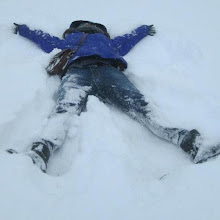Hello chaps,
I have developed a strange affinity with Kazan since
arriving in Piter, more so than previously. I maybe wouldn’t call it nostalgic
patriotism – I don’t think I have any desperate urge to return despite my
having a good time there. It’s just whenever any mention of Kazan comes up, and
that is surprisingly often, my little ears prick up and I will excitedly comment
“Ooh, I’ve been there”!
Great one, Fliss. Really great.
It’s the equivalent of someone in England saying “oh, you
know, I went to Manchester last week”. Kazan is the 3rd city in
Russia. The 3rd. Not the 23rd - it’s not really that
insignificant. It is more the fact that in England a comparatively small proportion
of people actually know of it, except maybe those who follow football and who
know the team ‘Rubin Kazan’. Piter and Moscow are much better known. Even
Leningrad, which technically no longer exists, is better known to English
people than Kazan.
That is the thing. When I say I’ve studied in Russia before
now, people always assume it was Moscow or St Petersburg. I have been reduced
to describing it as “on the Volga River, where Lenin went to university and
where Tolstoy was born”.
I guess now I should
elaborate on this a little further.
Kazan is on the Volga River, 400 miles east of Moscow. If
you draw a straight line up from the middle of Kazakhstan on a map, you will
end up in Kazan eventually. Russia is divided up into individual republics and
oblasts, based upon the tribes of people that originally inhabited that area.
This is why it is called the Russian Federation – Putin is the current
president of the federation of republics. Most of the oblasts/republics have
their own separate president.
Kazan is the capital city of the republic of Tatarstan. Its first
language is technically Tatar, which has a different alphabet from Russian and
shares few of the same words. It looks more like Azerbaijani. Everyone there
speaks Russian though, there was no problem for us speaking Russian out there.
Tatars are the direct descendants of Ivan the Terrible and the Mongolians, as
Kazan was invaded in 1552 by Ivan the Terrible.
Kazan, I would argue, is the religious capital of Russia. It
is one of the most important sites of the foundation of Russian orthodoxy due
to the tale of the young girl who had the vision of an angel, on the hills of
Kazan before it was established as a city, who told her to go forth and build a
city. (Forgive me, my knowledge on this is a bit rusty!!) The Virgin of Kazan
is one of the most famous Russian icon paintings – it is instantly recognisable
to anyone familiar with Russian icons. Both Moscow and Piter have a Kazan
cathedral, each with a massive picture of the Virgin of Kazan.
This is just a glimpse of the Kazan cathedral in Moscow.
This is the Kazan cathedral in Petersburg.
Tatars are traditionally a muslim people due to their
eastern origins and Kazan has the policy of maintaining a 50:50 proportion of
religion and race. Every time a church is built in Kazan, a mosque is built to
balance things out and vice-versa – there are some truly amazing religious
buildings in the city as a result of this! The newest mosque is the Kul-Sharif
mosque, which was built in 2005 as part of the 1000 year anniversary of the
foundation of Kazan. It was named after the imam who died defending the city
against the hordes of Ivan the Terrible, but many of the citizens there are somewhat
opposed to its architecture as they perceive it as being too Arabic and not
Tatar enough. Many of the other Tatar mosques I saw were more simple and plain
in their design.
The Kul-Sharif mosque
There is the saying ‘scratch a Russian and you will find a
Tatar’, which in part shows the impact that this lesser-known group of people
have had on shaping the Russian identity as we see it today. All the Tatar
people I’ve come across are, quite rightly, immensely proud of their cultural
heritage.
Oh and a point of interest: Kazan is the Tatar word for cooking pot, as the hills on which the city is built look like an upturned casserole. So now you know some Tatar ;)





It's interesting... Ivan IV called 'Grozny' in Russian which means rather 'redoubtable' or 'formidable', but not 'terrible'.
ReplyDelete